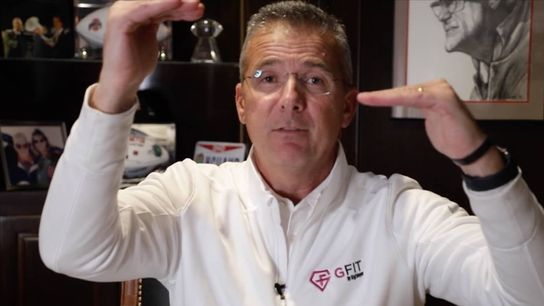Urban Meyer won three national titles and finished in the AP top-10 10 times. But his favorite of his 17 years in coaching was a time when his team didn't do either one of those things.
In his opening message to kick off the 2021 AFCA virtual convention, Meyer gave a 20-minute talk on how and why a head coach should go about identifying and rooting out problems within his organization -- specifically, when individuals or groups do not meet expectations.
"An elite leader is an expert on cause and effect," he said. "They don't focus on the 'what.' The 'what' is your team is not performing very well. Anyone can see that. Quit focusing on that, focus on the 'why.'"
"The louder you get, all you're really telling people is 'I have no idea what I'm talking about,'" he said at another point.
One of the main reasons teams fail to meet expectations, Meyer said, is a dysfunctional work environment, which he defined as follows:
"A functional work environment is when your expectations equate to your work ethic. A dysfunctional work environment is when your expectations exceed your work ethic. Everyone wants to go win a championship, people want to go be NFL draft picks, but you're not working very hard. That's where a head coach has a responsibility and an obligation to make sure you're very clear about that."
To illustrate that point, he told the story of the 2003 Utah team.
At the time, Meyer was an up-and-coming 39-year-old head coach, fresh off a successful 2-year run at Bowling Green. He inherited a Utah team fresh off a 5-6 season and a program that, while it had won a share of titles, hadn't won an outright conference championship since 1957.
Meyer was an unknown at the time, especially in the Mountain West, and so his first nine months on the job were, he implied, the best nine months of his head coaching career -- the only time he got to work in silence.
"I had a great staff, they came in, and all of a sudden the work ethic became elevated. It was amazing. People started seeing their bodies develop in the offseason, they became faster, stronger, more powerful. By the time you got to summer you had minimal expectations -- we were picked to finish near the bottom of the league -- yet you had some of the best work ethic I've ever witnessed in my coaching career. That was the ultimate working environment that I've ever been in,"
Utah would go 10-2 that season, winning the Mountain West outright and recording the program's first AP Top 25 finish in nearly a decade.
From there, expectations went through the roof and would remain there for the remainder of his career -- the undefeated season at Utah, and then the six seasons at Florida and seven at Ohio State.
On that token, Meyer would probably classify the 2009 and 2015 seasons as the least favorite of his career. Coming off national championship seasons and returning key pieces on both teams, his players and coaches in those years could have worked 24/7 and the work ethic still wouldn't have come close to meeting expectations, because the expectations were unreasonable. His 2009 Florida team went 13-1, his 2015 Ohio State team 12-1, and it was clear from the outside everyone on the inside was miserable throughout.
"When your want is greater than your work ethic, you've got a major, major problem," he said.
